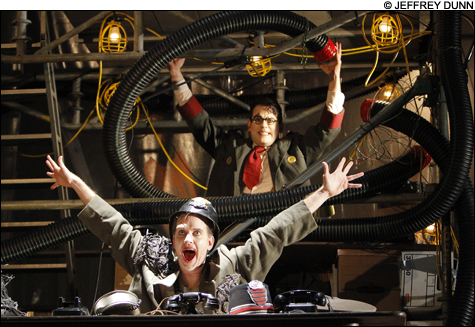
THE ONLY EMPEROR The BLO production catches both the score’s campy razzle-dazzle and its underlying melancholy. |
The Boston Lyric Opera, with Boston Classical Orchestra music director Steven Lipsitt and a company of singers and designers largely new to Boston, has given us a memorable production of the opera that composer Viktor Ullmann and poet Petr Kien created in 1943 at the Terezín concentration camp, The Emperor of Atlantis, or Death Quits (at the Boston Center for the Arts' Calderwood Pavilion through this Sunday, February 6). Part satire (the Emperor's name is Überall, German for "everywhere," besides conjuring "Deutschland über alles"), part elegy, The Emperor is an oblique parable about war in which Death is so disgusted with the militaristic Emperor that he refuses to let anyone die. Finally, it's most moving as a plea by these concentration-camp inmates to be relieved by Death of their suffering (which they would soon be, in 1944, at Auschwitz).
Ullmann's music is famously eclectic, post-Romantic and Modernist, with echoes of Schoenberg and Richard Strauss, even young Hindemith, but it emerges especially from the syncopated sound world of Kurt Weill, with its ironic pop tunes, ballroom dances, and hymns, in edgy jazz-band orchestrations (tenor sax and harmonium joining the strings and emphatic winds and brass). One section is marked "Shimmy, ma non presto." Lipsitt and his chamber players brought it all to vibrant life.
The big surprise, for a company not often admired for inventive staging, was the way stage director David Schweizer, imported from Glimmerglass Opera (which new BLO general director Esther Nelson left when she came to Boston), and set designer Caleb Wertenbaker caught both the score's campy razzle-dazzle and its underlying melancholy. Schweizer pulled out many stops; the production, and Nancy Leary's costumes, looked more like a circus than an opera. The singers were up and down scaffolds and ladders. The entire Calderwood auditorium (this is the latest installment in BLO's Opera Annex series, in venues other than its home base at the Shubert Theatre) was draped with the plastic sheeting you find covering buildings under construction. Every step or skip or fall responded to something in the music. If the music is something of a phantasmagoria, this production mirrored that quality. In an earlier generation, Wagner called it "gesamtkunstwerk," a gathering of all the arts.
The singers were well chosen for strong voices and excellent English diction. Leading the cast was New York bass Kevin Burdette as Death. This guy really knows how to slither and prance and jump all over the stage; yet he was most poignant when, at the end, he lies down. His ringing voice is both vigorous and sonorous. At times he looked devilishly like John Waters — which reinforced the iconoclastic finger he (figuratively) kept giving us. His pal in the opera is Harlequin, and Canadian tenor John Mac Master teased us and goosed us and for all his energized body language never ran out of vocal breath. Baritone Andrew Wilkowske was the scary Emperor ("How can I rule if no one fears me?"), who ultimately agrees to be the first recipient of Death's final change of heart. Mezzo-soprano Jamie Van Eyck made an imposing and sinister Drummer, always leading a parade, even when no one was following. Tenor Julius Ahn and soprano Kathryn Skemp, the only two principal singers who had appeared previously with BLO, were touching as the boy and girl soldiers who find love as their answer to war.